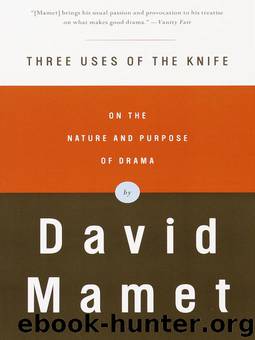Three Uses of the Knife by David Mamet

Author:David Mamet [Mamet, David]
Language: eng
Format: epub
ISBN: 9780804151085
Publisher: Knopf Doubleday Publishing Group
Published: 2013-08-21T04:00:00+00:00
Violence
The stoics wrote that the excellent king can walk through the streets unguarded. Our contemporary Secret Service spends tens of millions of dollars every time the president and his retinue venture forth.
Mythologically, the money and the effort are spent not to protect the president’s fragile life—all our lives are fragile—but to protect the body politic against the perception that his job is ceremonial, and that for all our attempts to invest it with real power—the Monroe Doctrine, the war powers act, the “button”—there’s no one there but us.
It is the notion of emptiness that the trappings of state are meant to counterbalance. (One could invert the stoics’ perception: a country that is unaware that its leadership is ceremonial, that must protect itself against or suppress that perception, must be unhappy. The work of repression may well create anger, and that anger may well be directed against the Leader, who embodies the untenable thought. And that is why the Leader is unsafe in the streets.)
Our Defense Department exists neither to “maintain our place in the world” nor to “provide security against external threats.” It exists because we are willing to squander all—wealth, youth, life, peace, honor, everything —to defend ourselves against feelings of our own worthlessness, our own powerlessness.
Our World Position is not tenuous, but our mental balance is. In our devotion to the ideas of our own superiority, we are like compulsive gamblers who destroy themselves by enacting a drama of their own worthlessness. They gamble neither to win or lose but to maintain equilibrium, which they can do only while gambling—loss and gain bring into focus the disparity between the gamblers’ actions and subconscious, and thus cause unrest.
When they win, these gamblers cannot explain to themselves why they continue. If they gambled for wealth, why does wealth not please them? When they, inevitably, lose, they cannot explain why they gambled in the first place—if it was for wealth, why couldn’t they see that the inevitable end was loss? Either result is unbearable, and so these gamblers must retreat to the compulsion, and surrender to illogic and pain to protect themselves against revelation.
Our baffling foreign policy similarly reveals a compulsion to engage in strife (either as participant or, if such a position is not available, as mediator, in the hope that mediation will lead to involvement in strife).
This compulsion spares us the trauma of dealing with the irreconcilability of two national drives—the need to confess and the need to brag. We deal with Korea by fighting the Vietnam War, with our national surplus and secure trade position by enacting the S & L tragedy. We, increasingly, cannot bear national equilibrium, or work for it, because in equilibrium we might have to confront the unconscious and unhappy underpinnings of our national character.
The superego is created to arbitrate the functions of the conscious and the unconscious mind. So are neuroses and psychoses, so are the arts. When art functions as the synthesizer, the arbitrator, balance is created. In great art—the Bible, Shakespeare, Bach—the balance is long-lasting.
Download
This site does not store any files on its server. We only index and link to content provided by other sites. Please contact the content providers to delete copyright contents if any and email us, we'll remove relevant links or contents immediately.
4 3 2 1: A Novel by Paul Auster(12393)
The handmaid's tale by Margaret Atwood(7764)
Giovanni's Room by James Baldwin(7346)
Asking the Right Questions: A Guide to Critical Thinking by M. Neil Browne & Stuart M. Keeley(5775)
Big Magic: Creative Living Beyond Fear by Elizabeth Gilbert(5773)
Ego Is the Enemy by Ryan Holiday(5450)
The Body: A Guide for Occupants by Bill Bryson(5097)
On Writing A Memoir of the Craft by Stephen King(4944)
Ken Follett - World without end by Ken Follett(4733)
Adulting by Kelly Williams Brown(4574)
Bluets by Maggie Nelson(4556)
Eat That Frog! by Brian Tracy(4540)
Guilty Pleasures by Laurell K Hamilton(4449)
The Poetry of Pablo Neruda by Pablo Neruda(4109)
Alive: The Story of the Andes Survivors by Piers Paul Read(4033)
White Noise - A Novel by Don DeLillo(4010)
Fingerprints of the Gods by Graham Hancock(4004)
The Book of Joy by Dalai Lama(3986)
The Bookshop by Penelope Fitzgerald(3854)
